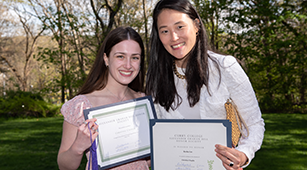Schedule an appointment to meet with Career & Experiential Learning about your area of interest.
Make an AppointmentFinancial Aid Opportunities
Applying for Aid
Did you know that 99% of new first-year students receive financial aid? To apply for need-based financial aid, just complete the Free Application for Federal Student Aid (FAFSA). We’ve compiled resources to help you complete the process, but if you need help, just ask.
Apply for Financial AidScholarships and Grants
In addition to the scholarships and grants offered by Curry, you can also find assistance from federal and state governments. While some are based on financial need, other programs support students pursuing certain careers. Don’t leave money on the table — see what’s available!
Explore Scholarships and GrantsStudent Loans
Student loans help make up the difference between the amount you can afford to pay out-of-pocket and any scholarships and grants you receive. Loans are available from federal, state and private sources.
Learn More About Student LoansWork Study
Earn money for living expenses under the Federal Work Study (FWS) program. Eligible students can find part-time openings on campus or at a community group. For consideration, you must complete the FAFSA.
Student Bill Resources
Tuition bills, financial aid deadlines, FAFSA — it can get confusing. We’re here to help you navigate the process.
Understanding Your Bill Pay Online Help ResourcesFinancial Aid Resources
Outside of a house or car, few expenses are as large as a college education. Use these resources to understand ways to keep your costs down, find scholarships and aid and build healthy financial habits.
Financial Aid Help and Resources Financial Aid Policies Money Management





